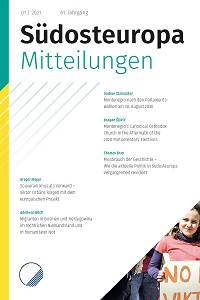Montenegro’s Canonical Orthodox Church and Transition to Democracy in the Aftermath of the 2020 Parliamentary Elections
Montenegro’s Canonical Orthodox Church and Transition to Democracy in the Aftermath of the 2020 Parliamentary Elections
Author(s): Dragan ŠljivićSubject(s): Politics, Governance, Public Administration, Electoral systems, Sociology of Religion
Published by: Südosteuropa Gesellschaft e.V.
Keywords: Canonical Orthodox Church; Montenegro; Parliamentary Elections; Serbian Orthodox Church;
Summary/Abstract: The most recent parliamentary elections in Montenegro can be regarded as a major thresholdin the history of this country, as they might set in motion a transition from the competitive authoritarianism of Milo Đukanović towards a genuine democracy. One actor in this process deserves closer scrutiny—the Serbian Orthodox Church. Its active role in undermining the legitimacy of the authoritarian regime stands in sharp contrast to the general perception of the Orthodox Church, namely of being a bystander during such a transition.This unexpected behavior could be explained by drawing on specific Montenegrin identity issues, conflict over property rights and the accumulation of non-religiously motivated dissent over the past years. After the elections, several potential trajectories in the church–state relationship in Montenegro may become available.
Journal: Südosteuropa Mitteilungen
- Issue Year: 61/2021
- Issue No: 01
- Page Range: 47-61
- Page Count: 15
- Language: English
- Content File-PDF

